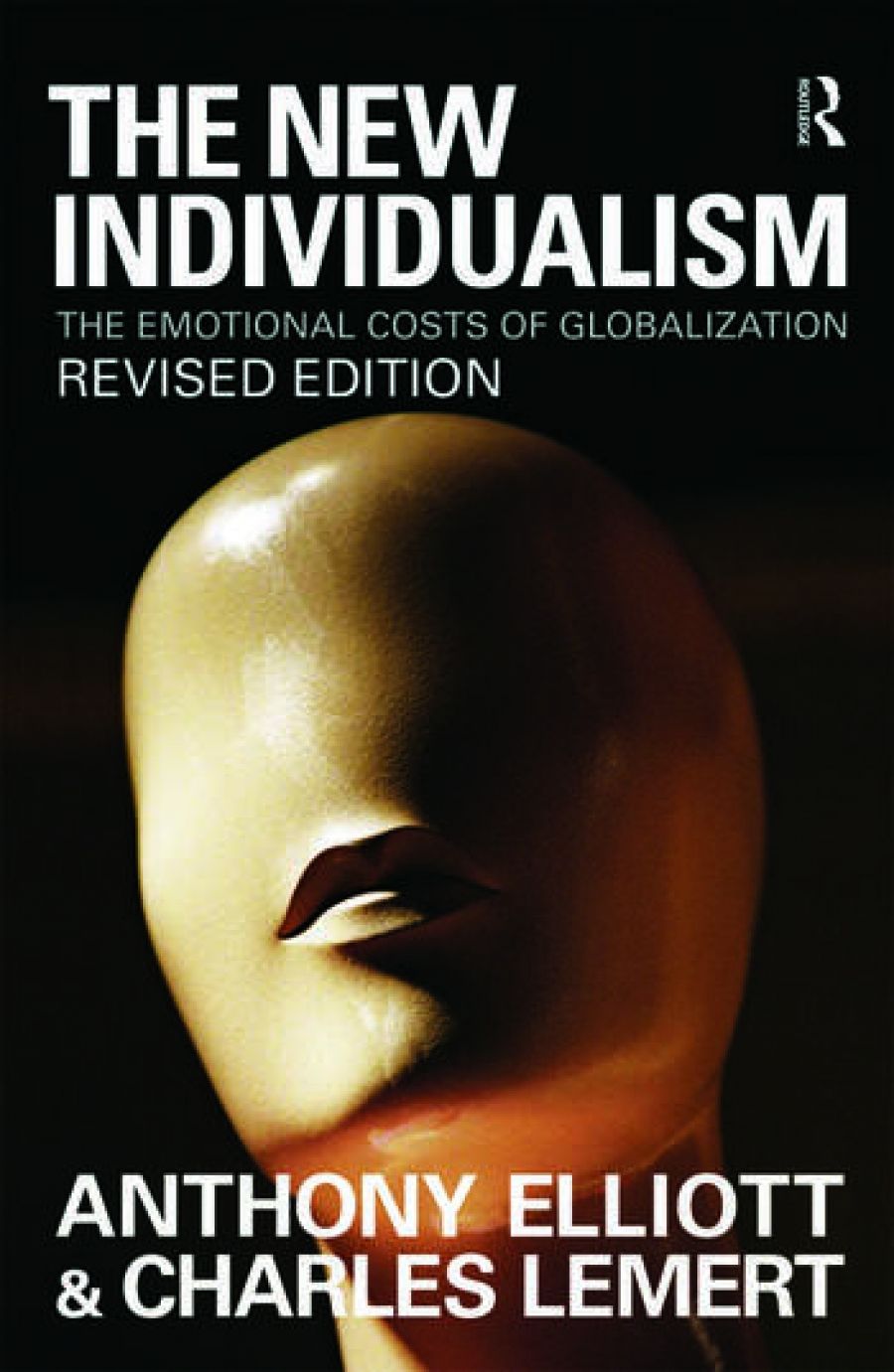
- Free Article: No
- Contents Category: Cultural Studies
- Review Article: Yes
- Article Title: Remaking the self
- Online Only: No
- Custom Highlight Text:
Writings on globalisation have so far been of three principal types. First came the fables of discovery: bold, confident and romantic. Next came the stories of resistance: variously decrying the consequences of the new order, or denying that there was anything particularly novel about this globalisation malarkey. More recently, however, we have entered the age of elaboration. These fresher writings extend the now familiar idea of globalisation onto new terrains. Just as concepts such as ‘space’, ‘postmodernism’ and ‘the body’ were once taken up by earnest specialists, so the idea of ‘globalisation’ is now used to revive tired topics and to attract jaded publishers. Bookshelves groan under the weight of fresh volumes promising to disclose the secrets of ‘globalisation and food/sport/religion/sex/politics etc.’. Thus the concept has itself been exported and capitalised on a remarkable, networked industry. Some of this work is opportunistic and shallow. Fortunately, however, Anthony Elliott and Charles Lemert’s entry to the field (which might be retitled ‘Globalisation and Individualism and Emotions’) attempts to say something new, serious and important.
- Book 1 Title: The New Individualism
- Book 1 Subtitle: The emotional costs of globalisation
- Book 1 Biblio: Routledge, $29.95 pb, 228 pp
The New Individualism aspires to document and explain the emotional textures of life in the global era: as the authors put it, ‘how individuals respond – creatively, defensively and pathologically – to globalizing social processes’. They draw upon interviews, psychoanalytic case histories, newspaper reports, autobiographical fragments, biographies of notables and family histories. They bring to this material an eclectic and modular intellectual tool kit, extending from Rousseau to Foucault, Adorno to Lasch, and de Tocqueville to Beck.
What is the outcome of their labours? The primary argument of the volume is that globalisation has produced a ‘new individualism’. The project to remake the self has been intensified by the accelerating rhythms of the labour market and the explosion of new technologies. Now, we strive to be ‘more efficient, faster, leaner, inventive and self-actualizing’ than we were previously. The authors reject the idea that this emotional landscape has been imposed by global élites or that it has degenerated into a complete retreat from political and public questions. Instead, Elliott and Lemert emphasise the importance of personal agency. This involves ‘ongoing emotional struggles’, as individuals continue to develop new versions of themselves, and the ‘processes and structures of self-definition are explicitly examined, raised and transformed’. In this way, the new individual rapidly makes herself into several individuals.
The book’s broader arguments are substantiated by the exploration of particular arenas of individual experience. One outstanding chapter examines the remaking of the erotic (as sexuality emerges as a key focus of personal identity, and the act of confession becomes ubiquitous and ongoing). The process leaves us with unprecedented opportunities for self-expression, but also with the danger of ‘sinking shallowness’ or a retreat inwards. Another chapter reimagines the experience of multiculturalism, not as the abstract celebration of difference but as the ‘hard work’ of living with differences in the ‘real world’. In these and other domains, individuals are buffeted by global forces, empowered to remake themselves, and challenged to contemplate the mixed, confusing results. There is no utopia, and yet there is much possibility: ‘To be an individual in such worlds is to be such a one who is willing to accept what cannot be changed in order to change what can.’
I found the subject of this book fascinating, the insights plentiful and the tone congenial. Inevitably, I also differed from the authors on occasion. Elliott and Lemert admit that their book does not seek out the voices of the poor or the marginalised. Their attempt to generalise from the privileged to the rest of society was largely unpersuasive, and their social narrowness limited the scope and interest of the work. The experiences of those who responded to globalisation by struggling from below were not explored, either. Those who cultivate an activist or community-minded self deserve consideration as much as the neurotic businessman or the lonely, addicted practitioner of ‘net-sex’.
Methodologically, the authors offer a substantial interpretation on a very thin empirical base. Most chapters rely on only two exemplary life histories. Not only that, the authors openly admit that these cases have sometimes been the product of partial invention or dramatisation. It is not clear how much has been tweaked in this fashion. Elliott and Lemert neither explain the scope of the method nor fully justify its adoption. They simply express a hope for its extension. A more old-fashioned approach, which sought to learn from a greater range of people, and showed greater respect for the real details of their emotions and words, would have offered deeper and more trustworthy insights.
Historically, I was also unconvinced by the account of contemporary change. Throughout, there is an unsatisfactory fluctuation between brash declamation and disarming qualification. The novelty of the contemporary world is constantly affirmed (‘everyone knows’) but nowhere demonstrated. At the same time, while the volume is organised as a sustained argument for the new individualism, the authors actually concede at one point that not all that much may be new about it. The question of what precisely has changed, and how this might have occurred, is not answered with sufficient precision.
Perhaps these are topics for future volumes. For now, Elliott and Lemert have managed to extend our understanding of globalisation, and of the emotions and selves of the privileged who live within its perplexing, giddy worlds.


Comments powered by CComment